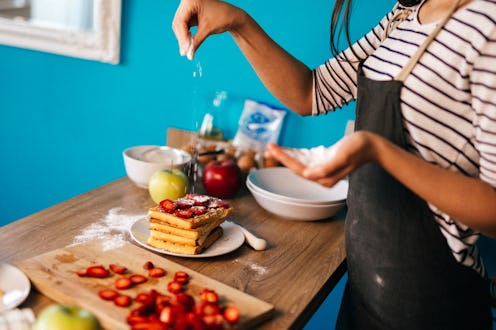
Eating is about so much more than just fueling our bodies. We’ve all experienced the curious excitement of trying a novelty food item, the guilt that can accompany an unhealthy snack, and pride over a successful home-cooked meal. But just what drives our behaviors? The answer is likely even more complex than you think.
Sophie Egan delves into why we eat the way we do in her new book, Devoured: From Chicken Wings to Kale Smoothies—How What We Eat Defines Who We Are. Never fear, though: The food writer isn’t out to shame you for any of your bad eating habits. (In fact, she tells Bustle that she’s “as guilty as the next person” when it comes to certain behaviors.) Egan’s intent is simply to explore the complicated factors that characterize American food culture.
Devoured offers a broad picture, nailing down everything from food at work to the fuzzy definition of a modern meal. With the average American’s lifestyle transforming drastically in recent decades, so too have our eating norms — potentially to our detriment.
“These [changes] happened over a very quick, very short amount of time, and we don’t really yet know what the long-term effects are going to be,” Egan tells Bustle. “Whether we realize it or not, we are all participating in a radical social experiment where the etiquette lags behind the behavior. … We don’t really have the rules worked out in terms of what’s reasonable.”
Take food on social media, for example. While apps even help you Instagram better food photos nowadays, there may be unexpected consequences to our food porn addiction. As much as this is what Egan calls “a beautiful outpouring of food photography,” she sees some negative outcomes as well.
“It can make eating, or going out to eat, so much more about getting that perfect picture than just enjoying the food while it’s hot,” she says.
On top of that, all that immaculately captured cuisine may intimidate those of us out there without Food Network-worthy culinary skills. “Sometimes, the pictures look so perfect and beautifully lit and all that, that it can, I think, distance people from wanting to prepare it themselves,” says Egan.
Cooking isn’t the same common ability it once was, as Devoured points out; in fact, Americans now typically spend only about 30 minutes a day actually doing it. As such, many of us can likely relate to Egan when she says that she’s “definitely not the cook [she’d] like to be.” While she tends to go all out on breakfast every day, there are plenty of evenings she orders food delivery because it feels like the only way she can get everything done.
The reality is that time constraints play a huge role in our food choices, whether that be lunching at our desks or replacing actual meals with snacks. And that is just one of myriad key factors that influence our eating habits.
“Individual food choices are shaped by the very powerful food environment around us,” Egan says.
Devoured provides the perspective needed to understand this cultural context, thereby helping us avoid getting caught up in what Egan calls “guilt-laden blame games.” Instead, she hopes we’ll use her book to “start to identify solutions that really do look at root causes.”
“It wasn’t a manifesto or meant to be providing all the answers, but I hope, collectively, it sparks a retraining of where we’re channeling our attention,” Egan says.